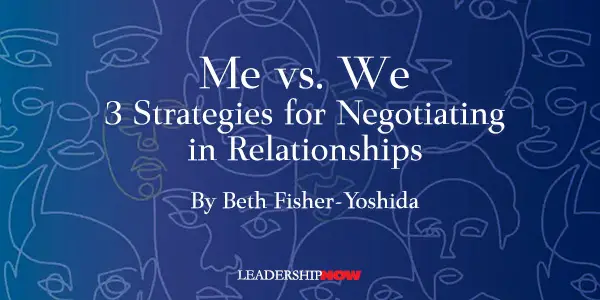 |
 |
02.17.23

Me vs. We: 3 Strategies for Negotiating in Relationships
NEGOTIATIONS can take on a life of their own. That’s because you plan how you’ll negotiate in isolation, yet you negotiate within a relationship—whether that relationship is professional or personal. Consciously deciding how you’ll approach the negotiation is a crucial part of your preparation. This might sound silly or unnecessary, but clearly stating your intentions to yourself will influence how successful the negotiation will be. Depending on your tone, the negotiation’s context, and how you frame it, the interaction will either be competitive or collaborative. Is your stance competitive or collaborative? If you go into a negotiation with the intention of winning without regard for the other party, you’ll be negotiating competitively. Your communication will be limited because you don’t want to give an advantage to the other side by providing information; your actions will continuously favor your side, your flexibility in being able to shift from your positions to needs will diminish, and you won’t be building trust. All of this will be influenced by your competitive orientation. You’ll win, and the other party will lose. On the other hand, if you have the intention of winning with the other party, you’ll have a collaborative framing of the negotiation. You’ll encourage open communication, share information to strengthen the other party, work on building trust, and take actions that will bring you closer to arriving at mutually beneficial outcomes. This approach will set the foundation for a healthy, long-term negotiating relationship. Creating healthier negotiations You may be wondering: Whose responsibility is it to create these healthier and mutually beneficial negotiations? The short answer is that we all hold some responsibility, but we may not know it. For example, let’s say you’re negotiating with a senior work colleague about an upcoming deadline. You may believe you don’t have sufficient power in the relationship to do anything but accommodate your colleague’s request. But I would counter that notion; while you may not hold all the power to make the final decision, there are ways you can influence it. Regardless of your initial intentions and whether the negotiation is going the way you planned, you can still influence the next steps and the direction you’d like the negotiation to take. For instance, if your colleague demands, “I need this on my desk by week’s end,” you can still respond with a question to find out more information. You might say, “I hear what you’re saying about wanting the results by the end of the week. I’d like to know more about what’s driving the quick turnaround and how I can make the necessary adjustments to accommodate you.” This technique slows down the negotiation’s pace and keeps you feeling confident that you still have some control over the process and outcomes. If you’re feeling pressured to produce results before you can comfortably deliver them, you’ll want to know more about the urgency of the deadline. It could be that some of the results are needed before others, so you can split up the work and focus on the more immediate needs first and deliver the remainder afterward. These actions allow you to be an active participant in the negotiation and parse out the critical information from the rest. Your willingness to hear the other party, understand their needs and make adjustments make you their negotiation partner, not an adversary. Try these three negotiation strategies Here are three tips to consider when emphasizing the “we” in your negotiating partnership:
 
Posted by Michael McKinney at 07:27 AM
|
BUILD YOUR KNOWLEDGE
 

How to Do Your Start-Up Right STRAIGHT TALK FOR START-UPS 
Grow Your Leadership Skills NEW AND UPCOMING LEADERSHIP BOOKS 
Leadership Minute BITE-SIZE CONCEPTS YOU CAN CHEW ON 
Classic Leadership Books BOOKS TO READ BEFORE YOU LEAD |